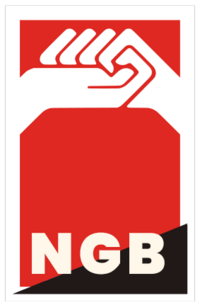Nidwaldeser Trade Union Confederation: Difference between revisions
(Created page with "{{Infobox organization | name = NGB | full_name = | native_name = Nidwaldeser Gewerkschaftsbund<br>({{wp|German language|Nidwaldeser}}) | nat...") |
No edit summary |
||
| Line 101: | Line 101: | ||
| bodystyle = | | bodystyle = | ||
}} | }} | ||
The '''Nidwaldeser Trade Union Confederation''' ({{German language|Nidwaldeser}}: ''Nidwaldeser Gewerkschaftsbund''; '''NGB''') is a [[Nidwalden|Nidwaldeser]] {{wp|national trade union center}} described as a confederation of trade unions. It is regarded as the largest in the country and one of the most important by affiliated workers and heritage. | The '''Nidwaldeser Trade Union Confederation''' ({{wp|German language|Nidwaldeser}}: ''Nidwaldeser Gewerkschaftsbund''; '''NGB''') is a [[Nidwalden|Nidwaldeser]] {{wp|national trade union center}} described as a confederation of trade unions. It is regarded as the largest in the country and one of the most important by affiliated workers and heritage. | ||
It was founded in 1909 by [[Carla Dreschnerg]], [[Conrad Faerberg]] and [[Hadwig Bösch]] with a strong {{wp|anarcho-syndicalist}} component and grouping under its sphere, several trade unions related to the heavy industrial sector, metal workers and the graphic industry, which at the time were expanding across urban centres in Nidwalden like [[Vaduz]], [[Saint Moritz]] and [[Koln]]. Since its beginnings, it has been described as an association of workers who identify with {{wp|anarchism}} and {{wp|libertarian}} ideas; although over the times, it has expanded its ideas to reach {{wp|feminism}} and {{wp|co-operativism}}, to name a few, in Nidwalden. As an umbrella organisation, the NGB does not engage in {{wp|collective bargaining}}, which is delegated to individual trade unions under its structure; nevertheless, the organisation does discuss the general lines of tripartite negotiations and labour agreements, and counts with an important influence in public debates. The organisation counts with its own newspaper, [[Der Arbeiter]], which is one of the most important in Nidwalden by circulation. | It was founded in 1909 by [[Carla Dreschnerg]], [[Conrad Faerberg]] and [[Hadwig Bösch]] with a strong {{wp|anarcho-syndicalist}} component and grouping under its sphere, several trade unions related to the heavy industrial sector, metal workers and the graphic industry, which at the time were expanding across urban centres in Nidwalden like [[Vaduz]], [[Saint Moritz]] and [[Koln]]. Since its beginnings, it has been described as an association of workers who identify with {{wp|anarchism}} and {{wp|libertarian}} ideas; although over the times, it has expanded its ideas to reach {{wp|feminism}} and {{wp|co-operativism}}, to name a few, in Nidwalden. As an umbrella organisation, the NGB does not engage in {{wp|collective bargaining}}, which is delegated to individual trade unions under its structure; nevertheless, the organisation does discuss the general lines of tripartite negotiations and labour agreements, and counts with an important influence in public debates. The organisation counts with its own newspaper, [[Der Arbeiter]], which is one of the most important in Nidwalden by circulation. | ||
Over the course of its history, the NGB has reformed in the practise its methods, which has caused conflicts among its members. The organisatio was one of the last to adapt to the introduction of the {{wp|Ghent system|Vilholfem system}}, which it described as {{wp|reformist}} and as direct influence of the state on trade unions; however, in 1954, the organisation adopted state subsidies, which are entirely given as worker's benefits. The current Secretary-General of the Nidwaldeser Trade Union Confederation is [[Hemma Ecksteing]]. | Over the course of its history, the NGB has reformed in the practise its methods, which has caused conflicts among its members. The organisatio was one of the last to adapt to the introduction of the {{wp|Ghent system|Vilholfem system}}, which it described as {{wp|reformist}} and as direct influence of the state on trade unions; however, in 1954, the organisation adopted state subsidies, which are entirely given as worker's benefits. The current Secretary-General of the Nidwaldeser Trade Union Confederation is [[Hemma Ecksteing]]. | ||
Revision as of 23:49, 14 August 2021
Nidwaldeser Gewerkschaftsbund (Nidwaldeser) | |
 Logo of the NGB | |
| Predecessor | General Nidwadeser Worker's Federation |
|---|---|
| Formation | February 12, 1909 |
| Founder | Carla Dreschnerg Conrad Faerberg Hadwig Bösch |
| Founded at | Vaduz, Grevenmacher |
| Type | Confederation of trade unions |
| Headquarters | Eichelg St. 778, Koln |
Membership | Approx. 84.1% of the labour workforce of Nidwalden |
Secretary-General | Hemma Ecksteing |
The Nidwaldeser Trade Union Confederation (Nidwaldeser: Nidwaldeser Gewerkschaftsbund; NGB) is a Nidwaldeser national trade union center described as a confederation of trade unions. It is regarded as the largest in the country and one of the most important by affiliated workers and heritage.
It was founded in 1909 by Carla Dreschnerg, Conrad Faerberg and Hadwig Bösch with a strong anarcho-syndicalist component and grouping under its sphere, several trade unions related to the heavy industrial sector, metal workers and the graphic industry, which at the time were expanding across urban centres in Nidwalden like Vaduz, Saint Moritz and Koln. Since its beginnings, it has been described as an association of workers who identify with anarchism and libertarian ideas; although over the times, it has expanded its ideas to reach feminism and co-operativism, to name a few, in Nidwalden. As an umbrella organisation, the NGB does not engage in collective bargaining, which is delegated to individual trade unions under its structure; nevertheless, the organisation does discuss the general lines of tripartite negotiations and labour agreements, and counts with an important influence in public debates. The organisation counts with its own newspaper, Der Arbeiter, which is one of the most important in Nidwalden by circulation.
Over the course of its history, the NGB has reformed in the practise its methods, which has caused conflicts among its members. The organisatio was one of the last to adapt to the introduction of the Vilholfem system, which it described as reformist and as direct influence of the state on trade unions; however, in 1954, the organisation adopted state subsidies, which are entirely given as worker's benefits. The current Secretary-General of the Nidwaldeser Trade Union Confederation is Hemma Ecksteing.